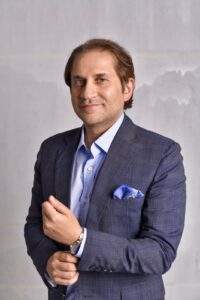
Neil Grunberg - Managing Partner - Co-Founder - StoryTime Capital
Longtrepreneur continues to bring the best-in-class tech and business leaders to get their take on long-term thinking in the world of Commerce, Technology and Entrepreneurship.
This week’s “Take the L” series guest is a personality who needs no introduction: Neil Grunberg – Managing Partner – Co-Founder at StoryTime Capital.
Here is the conversation in an interview format between Yawar Abbas(Longtrepreneur) and Neil Grunberg (StoryTime Capital).
Yawar Abbas: What was the first thought on your mind this morning?
Neil Grunberg: I’m going to get a workout in now. Should I sleep a few more minutes and work out later before my daughter’s hockey game? That was my first thought this morning.
Yawar Abbas: How do you see your daughter finding work when she reaches that age? The future of work will be completely different from what it is right now.
Neil Grunberg: That’s a great question! So, I have three daughters. Often during my pitches when we were fundraising, I brought them into all my conversations about that exact topic – work, and that the three of them are unlikely to do the same type of work I did earlier in my career. Highly unlikely they all, or possibly any of them have more traditional jobs in how we think of work.
Yawar Abbas: How big is the gig economy in the US?
Neil Grunberg: In today’s gig economy, over 45 percent of Americans have a side hustle, not all gig, but a good portion. This shift towards more fragmented, fractional work is reshaping how we think about jobs and expertise. As an example, for many, content creation is now an accessible career path, starkly contrasting how things operated 15 or 20 years ago.
Back then, if you were passionate about a particular topic, becoming an expert wasn’t enough — you had to land a job as a journalist to cover it or find a very specific niche.
Yawar Abbas: Which aspects of the future of work does Storytime Capital focus on?
Neil Grunberg: We, invest in companies that are changing how work is performed and prepared, planned for, rewarded, and measured. And that doesn’t just include traditional retailers or manufacturers or software companies. That can consist of companies working in the realm of the future of work, the gig economy, less traditional avenues, all the good stuff we have chatted about.
Yawar Abbas: Which companies have Storytime Capital invested in?
Neil Grunberg: A great example of Future of Work and we have been talking about, away from more traditional work or operational tools we invested in a company focusing on cyber security for content and social media assets. It is a great example of true future of work as there are so many content creators, journalist, and small brands where there social media assets are the lifeblood of their business. Protecting those assets are on the same level as a brick-and-mortar retail shop having their windows smashed. A content creator, brand, entrepreneur having their X account or their Instagram hacked or copied is devastating, crippling.
That company is Israeli based Spikerz. Check them out here.
Yawar Abbas: What ethos or unique insights intrigued Storytime Capital to invest in Spikerz?
Neil Grunberg: We initially said No. The team, however, kept updating us for months in a row. We saw their updates and thought, “The company is doing really well, and their sales are also growing at a time when it should be PRE revenue still.”
They did exactly what they said they were going to do. The best part was that they had sales, but still had the pre-revenue/pre-seed mentality.
Yawar Abbas: Which geographic areas does Storytime Capital invest in?
Neil Grunberg: We will invest anywhere from Dubai to Singapore to, Tel Aviv to Sydney, but the majority are focused on the US and Canada.
We also look to invest in places where we can provide the best advisory network to support our portfolio companies.
Yawar Abbas: As an industry veteran, how have you seen the Canadian tech landscape change from the beginning of your career until now?
Neil Grunberg: I think organization support. A great example is CDL, Mars or Communitech in Waterloo are some big industry tailwind providers.
I think the cycle of founders returning to the space as investors and advisors. I have a company like Workbrain where I got my start.
I look to the culture of that company and what the founders of that company did to create something special from day 1. We were encouraged to think big and think bold and be entrepreneurs inside the company, which then led to this entrepreneurial spirit that has carried in our network for 2 decades.
Yawar Abbas: How much influence does your wife(partner) have on your decisions?
Neil Grunberg: My life thesis revolves around taking risks, being an entrepreneur, and continuously learning.
I’ve traveled extensively, including 16 trips to Australia for Alayacare while raising three young children and having a supportive partner who has my back and allows me the freedom to create and take risks has been foundational.
Knowing someone cheering for me in my corner makes all the difference.
Yawar Abbas: When deciding whether to invest in a company through Storytime Capital, who do you call for guidance when in doubt?
Neil Grunberg: Our LP base has a tremendous amount of advisors. I also rely on many of the investors who supported us at AlayCare.
Yawar Abbas: What attracted you to work at Vortex Connect?
Neil Grunberg: Easy! Adrian is the company’s founder. We met at a sushi restaurant at Yonge and Eglinton. I immediately realized that this guy was a winner. He will find ways to win. It was a no brainer.
Yawar Abbas: Why did you pick Ryan Kimel and Lauren Epstein as your co-founders to build Storytime Capital?
Neil Grunberg: Ryan Kimel and I have been friends first for nearly 15 years and angel investors for seven or eight years. Our skill sets complement each other. He and his family have been very successful in property development for a long time based on their ability to pick winners.
As for Lauren, I met her for lunch, which lasted three hours – she answered a hundred of my questions about the space and was immediately a valuable mentor. Even after that lunch, we kept in touch over more lunches and phone calls.
She was accommodating with her experiences and knowledge. Worth mentioning she won “Mentor Of The Year” at CDL. I thought, “I come from an operational background.” Ryan has angel investing experience, and Lauren has venture and mentor experience. All three of us have complementary experiences.
Yawar Abbas: What do you look for when investing in companies? Is it the team or their story?
Neil Grunberg: It’s a combination of factors. The third element is how they plan to solve the problem. But I don’t mean in terms of specific features or steps.
I want to know their journey and how it connects with the problem they believe they’re solving.
I want to understand how they’ll approach it conceptually, with their team, their internal thought process, and their current resources. The path ahead will most often not look as expected.
Yawar Abbas: What do you want to be your legacy?
Neil Grunberg: That’s a great question.
I want Storytime Capital’s legacy to be that 20 years from now, dozens of founders and companies have created immense value for the ecosystem, with us playing a meaningful role in their journey.
I don’t want us to just be a line item on their cap table, but rather to have made a real impact. I hope there will be podcasts or conversations where founders, without needing to mention me or Storytime, reflect on their company’s pivotal moments and how someone—whether it’s us or one of our advisors—helped them through them. From that, they went on to accomplish great things.
That’s the legacy I want: to have helped entrepreneurs in the same way that many from WorkBrain went on to build their own companies. I want Storytime to be that kind of catalyst.




